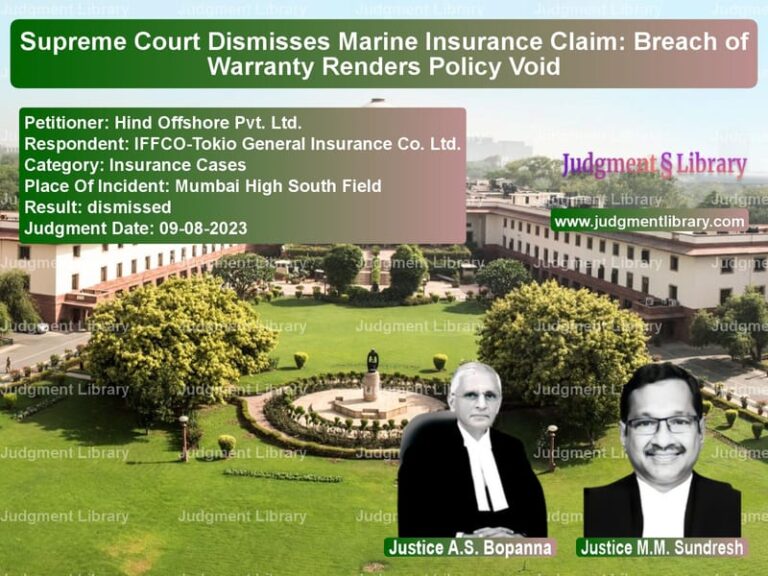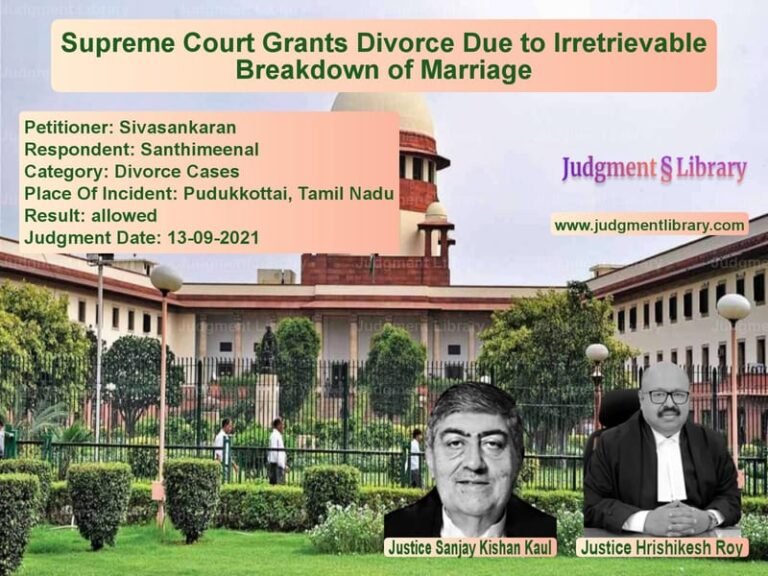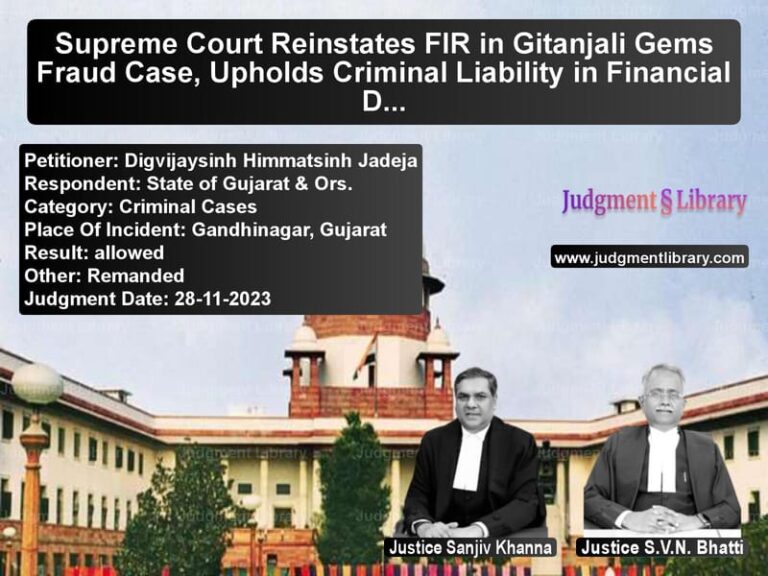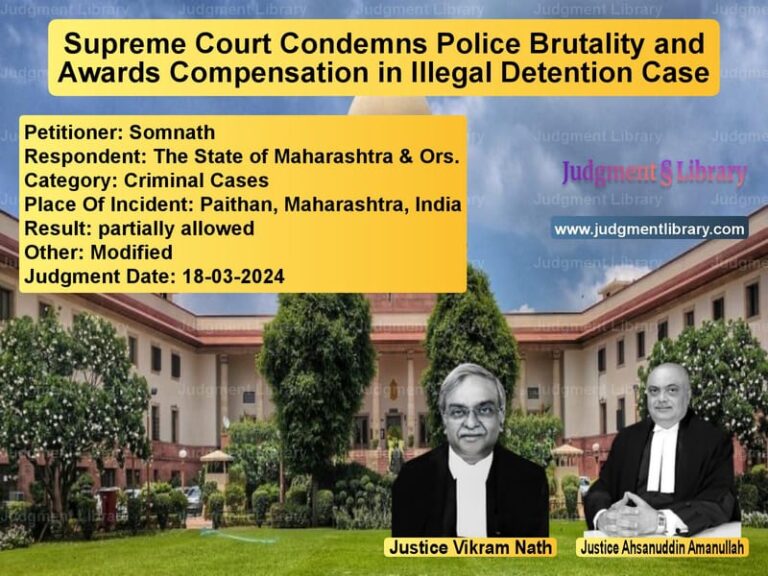Supreme Court Upholds Government Order on Forest Guard Training and Promotion
The case of Omkar Sinha & Anr. vs. Sahadat Khan & Ors. revolved around a dispute concerning the eligibility and promotional rights of Forest Guards in the state of Chhattisgarh. The primary issue was whether the appellants, who stood first in their training program, were entitled to direct entry into Forester training without entrance examinations, as per a government circular issued in 1977. The dispute arose when this practice was challenged after the state government issued a subsequent order modifying the earlier policy.
Background of the Case
The case originates from the appointment and promotion policies of the Forest Department in the undivided state of Madhya Pradesh. In 1977, the state issued a circular stating that Forest Guards who secured the highest marks in training would be directly admitted into the Ranger Training program without taking the entrance exam. This practice continued even after the formation of Chhattisgarh in 2000.
The sequence of key events leading to the Supreme Court judgment is as follows:
- 1980: The first respondent, Sahadat Khan, was appointed as a Forest Guard.
- 2007: The appellants, Omkar Sinha and another, were appointed as Forest Guards.
- 2009: The Chhattisgarh government issued an order revising the 1977 circular, granting two additional increments to top-performing trainees instead of direct admission into Forester training.
- 2012: The appellants, who had ranked first in training, claimed their right to be admitted into the Ranger training course based on the 1977 policy.
- 2013: The first respondent challenged this decision in the High Court, arguing that the 1977 circular had been revoked.
- 2015: The Chhattisgarh High Court ruled in favor of the first respondent, holding that the government’s new order in 2009 had effectively revoked the 1977 policy.
- 2022: The Supreme Court reviewed the decision and overturned the High Court’s ruling, reinstating the validity of the 1977 circular.
Petitioners’ Arguments
The appellants argued that the 1977 circular had not been legally withdrawn until 2012, and therefore, they were entitled to direct entry into the Ranger training program. They contended:
“The government’s decision to revoke the 1977 policy in 2009 was not formally communicated and lacked legal standing. The first respondent cannot claim retrospective benefits from a policy change that was never properly implemented.”
They further submitted that:
- The 1977 circular was a longstanding policy that had been followed for decades without dispute.
- Any change to such a policy required a formal notification, which was absent in the government’s 2009 decision.
- The government’s decision to revoke the circular was influenced by a labor strike rather than sound administrative reasons.
- They had already been admitted into the Ranger training course before any formal revocation took place.
Respondents’ Arguments
The first respondent, Sahadat Khan, challenged the validity of the 1977 circular, arguing that:
“The 1977 circular was outdated and inconsistent with the modern recruitment rules. The government correctly decided in 2009 to replace direct entry with financial incentives instead of preferential training admissions.”
He further contended that:
- Allowing direct entry into the Ranger training program without an entrance exam violated principles of fairness and equal opportunity.
- The Chhattisgarh government had the authority to modify outdated policies, and the 2009 decision was a justified revision.
- Since the appellants had not completed the required years of service as Forest Guards, they were ineligible for Forester training under the general rules.
Supreme Court’s Observations
The Supreme Court, comprising Justices K.M. Joseph and Hrishikesh Roy, reviewed the case and ruled in favor of the appellants. The Court emphasized:
“The 1977 circular was a valid government order that remained in force until it was expressly revoked in 2012. The state government’s actions in 2009 did not constitute a formal revocation, and therefore, the appellants’ right to direct entry into Forester training remained intact.”
The Court provided the following key findings:
- The Chhattisgarh government’s 2009 order was not a formal policy revocation but merely a recommendation.
- The state’s decision to offer additional increments instead of direct training admission did not automatically nullify the 1977 policy.
- The 2012 order, which officially revoked the 1977 circular, was passed after the appellants had already been admitted to the Ranger training program.
- The High Court had erroneously interpreted the 2009 order as an official revocation, leading to an incorrect judgment.
Final Ruling
The Supreme Court ruled in favor of the appellants and set aside the High Court’s decision. The key rulings included:
- The appellants’ admission into the Forester training program was legally valid.
- The government must uphold policies unless they are officially and formally revoked.
- The Chhattisgarh government had acted inconsistently by not properly documenting its policy changes.
- The 2009 order was not sufficient to override the 1977 circular.
Conclusion
The Supreme Court’s judgment underscores the importance of adhering to formal administrative procedures in policy changes. The ruling reinforces that government policies remain valid unless explicitly and formally revoked. The decision ensures that employees who have relied on longstanding government policies are not unfairly deprived of their rights due to ambiguous administrative decisions.
Petitioner Name: Omkar Sinha & Anr..Respondent Name: Sahadat Khan & Ors..Judgment By: Justice K.M. Joseph, Justice Hrishikesh Roy.Place Of Incident: Chhattisgarh.Judgment Date: 29-04-2022.
Don’t miss out on the full details! Download the complete judgment in PDF format below and gain valuable insights instantly!
Download Judgment: omkar-sinha-&-anr.-vs-sahadat-khan-&-ors.-supreme-court-of-india-judgment-dated-29-04-2022.pdf
Directly Download Judgment: Directly download this Judgment
See all petitions in Promotion Cases
See all petitions in Public Sector Employees
See all petitions in Recruitment Policies
See all petitions in Judgment by K.M. Joseph
See all petitions in Judgment by Hrishikesh Roy
See all petitions in allowed
See all petitions in Quashed
See all petitions in supreme court of India judgments April 2022
See all petitions in 2022 judgments
See all posts in Service Matters Category
See all allowed petitions in Service Matters Category
See all Dismissed petitions in Service Matters Category
See all partially allowed petitions in Service Matters Category







